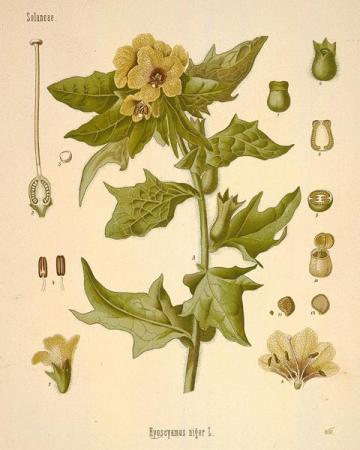A very long time ago, when I was taking my SATs, I encountered a short, four letter word in the analogy section that I didn’t know: bane. Reader, if you are under the age of 17 and still have SATs to look forward to, by golly I want to teach you what the word means. It means a cause of harm, ruin, or death. In Anglo Saxon it means “murderer.” I guessed wrong on the test, and subsequently started seeing or reading that word every time I opened a book.
As I research poisons (the subject of my next book), I have found that the common names of many poisonous plants include the word “bane.” They got their names either because they poisoned grazing animals, or because they were used by humans to poison “pest” animals (like wolves and wild dogs). They all contain powerful alkaloids, but have also been used as medicines, and humans have known about them for centuries. Also, it’s amazing how often Shakespeare mentions the “bane” poisons. Here are a few:
![Monkshood or Wolfsbane David Baird [CC-BY-SA-2.0 (http://creativecommons.org/licenses/by-sa/2.0)], via Wikimedia Commons](https://www.sarahalbeebooks.com/wp-content/uploads/2014/11/Monks-hood_-_geograph.org_.uk_-_542573-450x325.jpg)
Monkshood or Wolfsbane
David Baird [CC-BY-SA-2.0 (http://creativecommons.org/licenses/by-sa/2.0)], via Wikimedia Commons
Henbane (Hyoscyamus niger) It may be the poison Hamlet’s ghostly father mentions (“hebenon” is henbane):
Sleeping within mine orchard,
My custom always of the afternoon
Upon my secure hour thy uncle stole,
With juice of cursed hebenon in a vial,
And in the porches of mine ear did pour
The leprous distillment.
![cowbane By Anneli Salo (Own work) [CC-BY-SA-3.0 (http://creativecommons.org/licenses/by-sa/3.0)], via Wikimedia Commons](https://www.sarahalbeebooks.com/wp-content/uploads/2014/11/512px-Cicuta_virosa_Myrkkykeiso_IMG_0357_C-450x299.jpg)
cowbane
By Anneli Salo (Own work) [CC-BY-SA-3.0 (http://creativecommons.org/licenses/by-sa/3.0)], via Wikimedia Commons
Root of hemlock, digg’d in the dark

